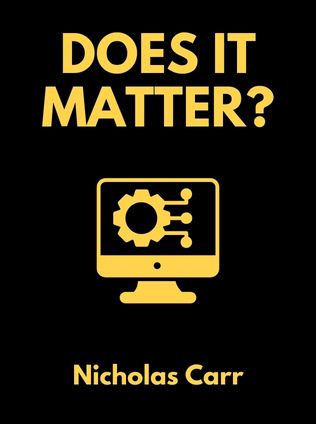
Does IT Matter?
Information Technology and the Corrosion of Competitive Advantage
By Nicholas Carr
Published 07/2004
About the Author
Nicholas G. Carr is a distinguished business writer and thinker, best known for his challenging and thought-provoking ideas about the role of information technology (IT) in modern business. A former executive editor of the Harvard Business Review, Carr has published numerous articles and books that explore the implications of IT on business strategy, operations, and competitive advantage. His 2003 Harvard Business Review article, "IT Doesn't Matter," sparked widespread debate by arguing that IT has become a commodity and no longer provides a strategic advantage. This book, Does IT Matter?, expands on that article, delving deeper into the evolution of IT and its impact on business practices and strategy.
Main Idea
In Does IT Matter?, Carr argues that information technology, once a source of significant competitive advantage, has evolved into a commodity that is accessible to all businesses. Because IT is no longer scarce or unique, it cannot be the foundation of a sustainable competitive advantage. Carr contends that while IT is crucial for the basic operations of any business, it no longer provides the distinctiveness needed to stand out in a competitive market. Instead, the focus should be on controlling costs and mitigating risks associated with IT, rather than seeking strategic advantages through technological innovation alone.
Table of Contents
- A New Business Infrastructure
- The Nature and Evolution of Infrastructural Technologies
- The Fate of Hardware and Software
- Vanishing Advantage
- The Corrosion of Traditional Advantages
- Managing the Money Pit
- The Future of Technological Change
A New Business Infrastructure
One of the greatest discoveries of the 20th century was the microprocessor. It dramatically improved the efficiency of earlier supercomputers and changed the way the world did business. The evolution from mainframes to local area networks to personal computers created a proliferation of information technology (IT) and its infrastructure, shaping business over the last 40 years. Corporate spending on IT reflects its importance; from just 5 percent of capital expenditures in 1965, it grew to over 50 percent by the turn of the century.
IT's core functions - data storage, processing, and transport - have become ubiquitous and affordable, transforming IT into a commodity. The strategic advantage once provided by IT has dissipated because it is now accessible to all businesses. As Carr puts it, “Scarcity, not ubiquity, makes a business resource strategic.” Without distinctiveness, the basis for competition becomes pricing, leading to thinner profit margins.
Changing Role of IT
The transformation of IT from a source of competitive advantage to a cost of doing business raises significant challenges. Executives must rethink their approach to IT spending and management. With IT merging into general business infrastructure, the focus shifts from innovation to mitigating risk and controlling costs. Carr compares IT to earlier infrastructural technologies like the steam engine, railroad, and electricity, which also transformed industries but eventually became commodities.
Sign up for FREE and get access to 1,400+ books summaries.
You May Also Like
Rich Dad Poor Dad
What the Rich Teach Their Kids About Money - That the Poor and Middle Class Do Not!
By Robert T. KiyosakiFreakonomics
A Rogue Economist Explores the Hidden Side of Everything
By Steven D. Levitt and Stephen J. DubnerThe Lean Startup
How Today's Entrepreneurs Use Continuous Innovation to Create Radically Successful Businesses
By Eric RiesWho Moved My Cheese?
An Amazing Way to Deal with Change in Your Work and in Your Life
By Spencer Johnson, M.D.Factfulness
Ten Reasons We're Wrong About the World – and Why Things Are Better Than You Think
By Hans RoslingMake Your Bed
Little Things That Can Change Your Life...And Maybe the World
By William H. McRaven



















